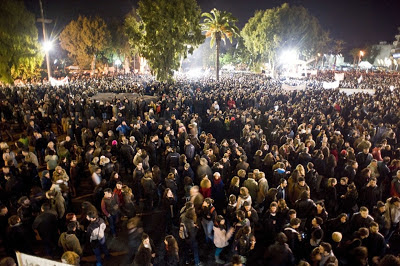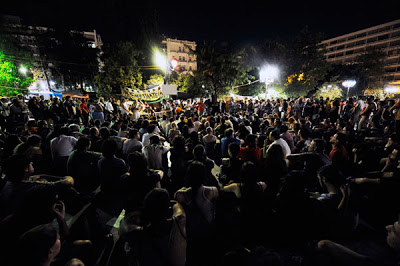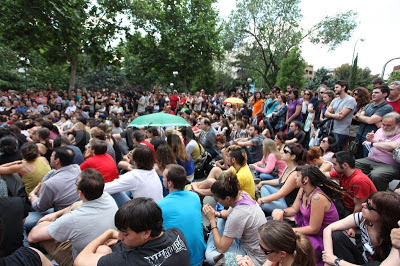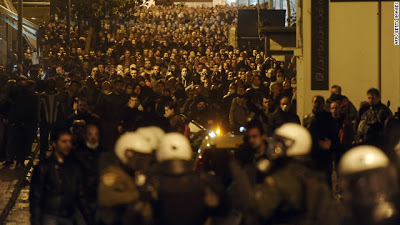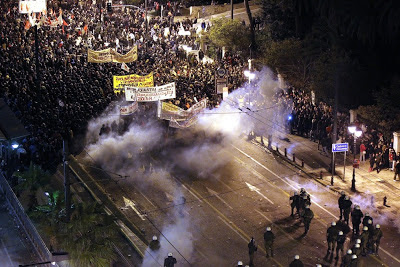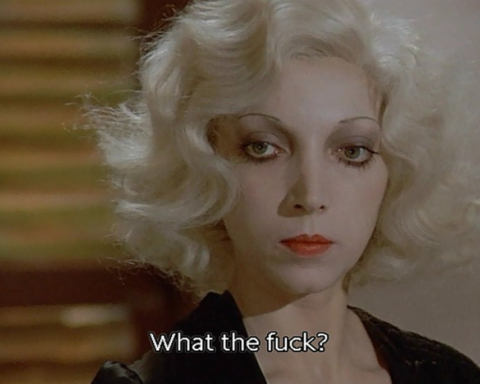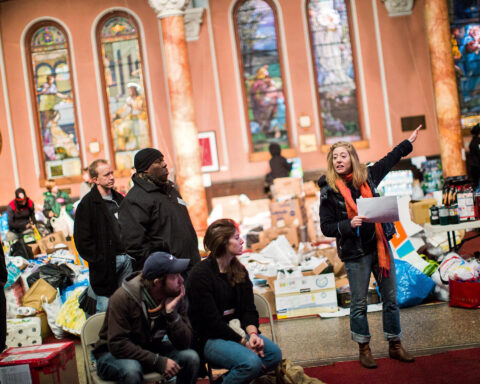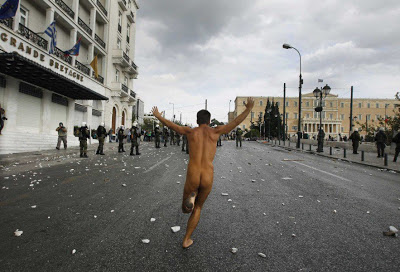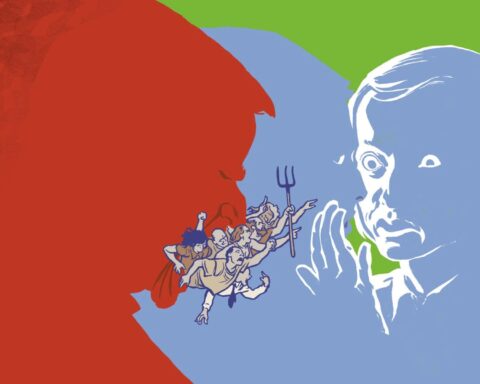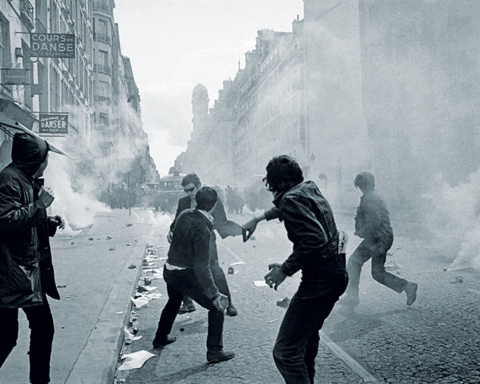In the first of a two part correspondence, John Holloway and Michael Hardt discuss some common themes that have emerged from their most recent books “Crack Capitalism” and “CommonWealth” and touch of the topics of organisation, democracy and institutionalism. The second part of the exchange will be published in Issue 15 of Shift magazine. July 2010
Dear John,
One of the things I love about ‘Crack Capitalism’, which it shares with ‘Change the World Without Taking Power’, is that its argument traces the genealogy of revolt. In other words, you start with the indignation, rage, and anger that people feel but you don’t stop there. Your argument leads revolt toward both creative practice and theoretical investigation.
On the one hand, although refusal is essential, perhaps even primary in your argument, especially the break with or exodus from capitalist social forms, every destructive force has to be accompanied by a creative one, every effort to tear down the world around us has to be aimed also toward the creation of a new one. Moreover these two processes, the destructive and the constructive, are not separable but completely embedded or entwined with each other. That is why, as you say, it makes no sense to defer creating a new society until after the complete collapse or demolition of capitalist society. Instead we must struggle now to create a new society in the shell of the old or, rather, in its cracks, its interstices.
On the other hand, you demonstrate how revolt must lead not only to practical but also to theoretical innovation. Although your book starts with an affective state and instances of practical resistance, the central argument involves a conceptual investigation, most importantly, it seems to me, about the role and potential of our productive capacities in capitalist society. I don’t mean to pose a separation here between practice and theory. In fact, your argument requires that they too are completely embedded or entwined. In order to change the world we need not only to act differently but also to think differently, which requires that we work on concepts and sometimes invent new concepts.
The core argument of the book, which distinguishes doing from labor and identifies abstraction as a primary power of capitalist domination, seems to me profoundly Marxist. It might seem paradoxical to say that because you carefully contrast your argument to orthodox Marxist traditions, situating your point instead in relation to Marx’s own writings, sometimes elucidating what he actually says and demonstrating how it goes against the orthodox Marxist tradition and at other times going beyond Marx. Although your argument stands indeed against the orthodox Marxist tradition, reading Marx against Marxism in this way and going beyond Marx puts you solidly in line (or, perhaps better, in dialogue) with a strong current of what was once called heterodox Marxist traditions that have been active since the 1960s. This is clearly apparent, for instance, in the claim, central to your argument in this book, that the course of our project for freedom lies not in the liberation of work, as is championed by Marxist orthodoxies and Soviet ideology, but the liberation from work. I see this as an essential slogan or principle of this heterodox tradition.
One thing that occurs to me is that whereas in the 1970s orthodox Marxism was indeed dominant, bolstered by the ideologues of various official communist parties, today that line of interpretation is virtually completely discredited. Instead Marxist theory today is primary characterized, in my view, by what used to be the heterodox line, which you helped develop together with your colleagues in the Conference of Socialist Economists and in collaboration with similar tendencies in Italy, Germany, and France. That’s a good thing and makes Marxist theory today more interesting and relevant.
I don’t mean by this to rein you back in within Marxism. Like you, I care little about whether my work is called Marxist or not. I often find that Marxists accuse me of being not Marxist enough and non-Marxists fault me for being too Marxist. None of that matters to me. What is important, though, is how useful I find it to read Marx’s work and it strikes me how useful it is for you too in this book.
One profound and important resonance your argument in this book shares with Marx’s writings resides in the identification of labor (or human productive capacity) as the site of both our exploitation and our power. You designate this duality by distinguishing labor (which you identify as production within a regime of capitalist abstraction) from doing (which strikes me as very similar to Marx’s notion of ‘living labor’). On the one hand, capital needs our productive capacities and could not exist and reproduce without them. Capital, in other words, does not just oppress or dominate us but exploits us, meaning that it must constantly seek to domesticate and command our productive powers within the limited frame of its social system. In your argument this is accomplished primarily by processes of abstraction. On the other hand, our productive capacities always exceed and are potentially autonomous from capital. That dissymmetry is crucial: whereas capital cannot survive without our labor, our productive capacities can potentially exist and thrive without capitalist organization. Indeed, as you demonstrate, there are always already innumerable instances of our productive autonomy that exist within the cracks or interstices of capitalist society. These are extremely important but not enough. Your project is to create alternative social networks of autonomous productive cooperation that can, as I said earlier, build a society of freedom from within capitalist society.
As I read ‘Crack Capitalism’, then, it seems to me that, whereas ‘Change the World’ adopted and extended the project for the abolition of the state, even its abolition within our own minds and practices, this book works through the project of the refusal of work — with the understanding that every rebellion against the capitalist labor regime is also, necessarily, a development of our own autonomous capacities for doing, that the destruction of the work society is coupled with the creation of a new society based on an alternative notion of production and productivity.
That brings me to a first, initial question. We know that the capitalist labor regime has extraordinarily well developed systems of social organization and cooperation, which function through discipline and control. You analyze these primarily through the lens of abstraction. The mainstream workers movements and, primarily the industrial trade unions, have also developed forms of organization and discipline into a sort of counter-power, but, according to your analysis, this too, like the capitalist regime, is dedicated to the organization of abstract labor. I think I understand this critique and agree with it in large part, with the caveat, as you say, citing the excellent book by Karl Heinz Roth published in the 1970s, that there has always also been an ‘other’ workers movement. My question, then, how can our autonomous productive practices, our doing, be organized and sustained as alternative social forms? I think you would agree that the schemes of cooperation and coordination among our practices of doing are not spontaneous but need to be organized. I would add that we need to create institutions of social cooperation, and you might agree with this too as long as I explain that by institution here I do not mean a bureaucratic structure but rather, as anthropologists use the term, a repeated social practice, a habit, that structures social relations. What institutions do we already have that fulfill this role and what kinds can we develop? And, more specifically, what relation can this have to the syndicalist traditions? The point here, of course, is not to reject entirely the traditional organizations of workers movements but, in some respects, extend and transform them. Here I would want to explore the innovations within contemporary labor organizing that point in the direction of your argument. Can we imagine instead of a traditional labor movement an association or syndicate of doers or, better, a social institution of doing? What would be its mechanisms of social cooperation and structures of organization? I’m not sure you have the answers to these questions, and I don’t pretend to myself, but I think you have some ways of thinking about how we can develop the structures and institutions of a society of doing and that is where I would first like to direct our exchange.
Best, Michael
December 2010
Dear Michael,
Thank you very much for your comments and for their tone which seems to me just right: a strong sense of shared concern and direction and a desire to move forward through exploring our differences. This reflects very much what I felt while I was reading ‘Commonwealth’: a sense of the very close touching of your preoccupations with mine, a feeling of walking arm in arm, at times too close, at times tugging in different directions, producing a sequence of bumps of admiration, enthusiasm and exasperation.
The question you raise at the end of your letter is exactly right because it hits directly on one of my main concerns while reading ‘Commonwealth’: the issue of institutions, which you and Toni emphasise a lot and which you develop especially in the last part of the book.
Our preoccupation, I think, is the same, but the answer we give is rather different. Our shared concern is: how do we go on after the explosions of rage, the jacqueries as you call them? The argentinazo of almost ten years ago, when the people in the streets of Argentina toppled one president after another to the resounding cry of ‘que se vayan todos’ (out with the lot of them); the alterglobalisation movement and the great anti-summit protests in Seattle, Cancún, Genoa, Gleneagles, Rostock and so on; the explosions of rage in the last year in Greece, France, Italy, Britain, Ireland and now, as I write, Tunisia, Egypt, Algeria. Great. We applaud, jump up and down with excitement. But then what? How do we go on? We both agree that rage is not enough, that there must be a positive moment. We both agree that the answer is not to build the party and win the next election or seize control of the state. But, if not that, then what? The answer you offer is ‘Insititutionalise. Create institutions to give duration to the achievements of the surge of revolt’. And I want to say ‘no, no, no, that is not the way to go, that is a dangerous proposal’.
Certainly I do not want to caricature what you are saying, for there is a great deal of care and subtlety in your argument. In your letter you say ‘I would add that we need to create institutions of social cooperation, and you might agree with this too as long as I explain that by institution here I do not mean a bureaucratic structure but rather, as anthropologists use the term, a repeated social practice, a habit, that structures social relations.’ But no, I do not agree with that, even taking into account your broad understanding of institutions.
Why do I not agree? Firstly, because although you argue for an extended understanding of institutionalisation, you open a door in which the distinction between the two meanings will become blurred. The repeated social practice slips easily into a bureaucratic structure and unless you create a very sharp distinction between the two (by using different words, for example), there is a danger that you legitimate this slippage. In the book, the distinction is clear at times, but at times it seems to evaporate, as in the surprising and perplexing suggestion on p.380 that UN agencies might provide a global guaranteed income (the mind boggles). Institutionalisation leads easily into a state-centred politics – how else could you even imagine achieving such a UN guarantee?
Secondly, I disagree because institutionalisation always means projecting the present on the future. Even in the soft sense of a repeated social practice, it creates an expectation that the young should behave as their parents (or older sisters and brothers) did. But no, they should not. ‘That’s not the way to do it, this is what you should do’, said the veterans of 1968 to the students in the great UNAM strike in 2000, but fortunately (or not) the students paid no attention. Institutionalisation is always a consecration of tradition, is it not? And what did Toni write years ago about tradition being the enemy of class struggle? I don’t remember exactly what or where, but I do remember thinking it was wonderful.
Thirdly, institutionalisation does not work, or not in the way that it is intended to. There is a flow of struggle, a social flow of rebellion (as my friend Sergio Tischler puts it) that cannot be controlled and that repeatedly sweeps aside institutions devised to channel it in a certain direction. My feeling is that you give too much weight to institutions in your understanding of society. Can love be institutionalised? I agree completely with your daring understanding of the revolutionary force of love, but then you must ask, can love be institutionalised? Surely not. Even if we say that we are not talking of a contract of marriage, but simply “a repeated social practice, a habit”, then probably the experience of all of us is that love constantly clashes with habit. Love may well survive in a context of repeated social practice, but only if it moves constantly in-against-and-beyond it.
Think of the World Social Forum, the prime institution to have emerged from the alterglobalisation movement. I am not particularly opposed to it and I think it can provide a useful and enjoyable meeting place, but, contrary to the intentions of most participants, it tends to promote a bureaucratization of the movement and it certainly is not the key to revolution.
Institutionalisation (broad or narrow) means trying to set life on railway tracks or highways, whereas rebellion is the constant attempt to break from that, to invent new ways of doing things. The proposal to create institutions, as I see it, says that the old roads to revolution no longer work and we must create new roads for those who follow us to walk along. But surely not: revolution is always a process of making our own paths. ‘Se hace el camino al andar’ (we make the road by walking – eds’ translation) is an integral part of the revolutionary process. I see the very idea of institutionalisation as an aspect of the organisation of human activity as abstract labour, just what we are fighting against.
‘Too easy’, you may say and of course you would be right. Does there not have to be some form of social organization? Certainly, but our forms of organisation, the forms of organisation that point towards a different society, cannot be thought of as being fixed. We have ideas and principles and experiences and directions that are more or less common to the movements against capitalism, but given that we ourselves, our practices and ideas are so marked by the society we are struggling against, the forms of organisation can only be experimental, a process of moving by trial and error and reflection.
But does there not have to be a coming together of the cracks? Yes, and I think this is an issue that is not sufficiently explored in my book. I would like to develop further at some point the question of the confluence of the cracks, both in terms of the inspirational lighting of prairie fires and the practical organisation of cooperation. But two things. I feel that institutional thinking is probably an obstacle to seeing the practice and potential of such confluence. And secondly it is important to think of the confluence as an always experimental moving from the particular, not a charting of the future that moves from the totality, as I think is the tendency in your book. We are in the cracks and pushing from there. Our problem is to break and move beyond, not to erect an alternative system of governance. We can try to follow the practices of existing movements, criticise them and see how the confluence is or is not being achieved, but we cannot establish a model for the future.
Dignity is a fleet-footed dance, I suggest in the book. But the doubt that arises is that perhaps we are not capable of such agility. Perhaps we are capable only of moving more slowly. Maybe we need institutions as crutches, so that we can consolidate each step we make. Conceivably so, but even then learning to walk is a throwing away of the crutches. We betray ourselves if we do not couple subversion with institutionalisation. If we must institutionalise, then we should subvert our own institutions in the same breath. This is akin to the question of identification. In ‘Change the World’, I accept that it may sometimes be important to affirm our identity, but only if we subvert it or go beyond it in the same breath, and what you and Toni say in your discussion of identity is similar. Institutionalise-and-subvert, then, is a formulation that I would find more attractive, but even then I do not like it. Institutionalisation may be inevitable at times, but in the tension between institutionalisation and subversion we have already taken sides. Thought is subversion. To think is to move beyond, as Ernst Bloch says – Ernst Bloch, whom you cite several times in the book, but whom Toni elsewhere unforgivably, unforgivenly characterises as a bourgeois philosopher (Antonio Negri, ‘Time for Revolution’, 2003, p. 109).
Publication, of course, is a form of institutionalisation and I do participate actively in this. In publishing my arguments, I give them a fixity. But perhaps this interchange of letters is an attempt by both of us to subvert that institutionality: the purpose is not to defend positions taken but to provoke each other to move beyond what we have already written.
And then an unavoidable theme if we are talking of institutions: what can I say of the title of your last chapter – ‘Governing the Revolution’? A horrifying oxymoron? A fiercely audacious provocation? Or is it a serious suggestion? To the extent that it seems to be a serious suggestion, it certainly provokes and horrifies me. What upsets me is that the phrase suggests a separation between governing and revolution whereas for me revolution is the abolition of this separation. Governing the revolution immediately makes me ask who, who is going to govern it? Just as your statement on p.377 that ‘humans are trainable’ also scares me, for who is to do the training? Who would govern your revolution, who would train the humans? If you say we are talking of self-governance, then fine, but why not talk then of the organisational forms of self-determination, understanding that self-determination means a process of self-education, self-transformation? But if we rephrase the question like that, then we immediately have to say that the organisational forms of self-determination are self-determining and therefore cannot be institutionalised.
Let me open a second front of concern. Democracy. You centre the discussion of revolution on the struggle for democracy. The abolition of capitalism takes a back seat, as it were, and that confuses me. You formulate the argument in chapter 5.3 in terms of a programme to save capital and then say that it is not that you are abandoning the idea of revolution, but just working with a different notion of transition. I am not clear what you mean by this different notion of transition. It sounds almost like a programme of transitional demands, a concept of achieving anti-capitalist revolution by fighting for a democracy that we know (but do not say openly) is incompatible with capitalism. The danger is that the more you talk about democracy and the less about capitalism, the more the whole question of revolution fades into the background. It seems to me much simpler to start the other way around, by saying: capitalism is a catastrophe, how do we get rid of it?
This letter is unreasonably long. Your fault, of course, for writing such a stimulating book. I look forward to your replies.
Best wishes,
John
John Holloway is a Professor in the Instituto de Ciencias Sociales y Humanidades of the Benemerita Universidad Autonoma de Puebla in Mexico.
Michael Hardt is professor of Literature at Duke University in the USA and has published several books, including ‘Empire’ and ‘Commonwealth’, with Antonio Negri.
source: Shift magazine # 14 http://shiftmag.co.uk/?p=596
